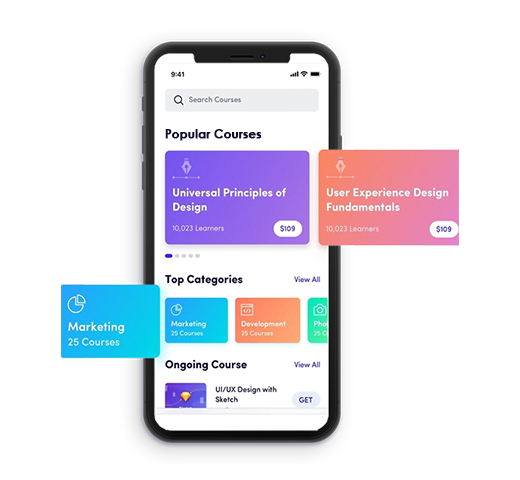e-Learning App Development Company
Udemy Clone App Development
Udemy Clone is an easily customizable platform with amazing features to make your e-learning startup smart. You can launch your e-learning platform in no time because our udemy clone is pre-built version.
Do you want to be part of the e-learning revolution? Our Udemy clone software is a smart choice to fulfill your desires. Let's get ready to map skilled instructors with active students with our udemy clone.


Udemy Clone App Development
Developing a Udemy clone app involves creating a platform that allows users to access online courses and learn various subjects. The app should have features such as user registration, course browsing, course enrollment, video playback, quizzes, progress tracking, and payment integration.
It requires backend development to handle user authentication, course management, and database operations, as well as front-end development for the user interface.
Additionally, incorporating features like reviews, ratings, and recommendations can enhance the user experience.
Udemy Clone App features
A Udemy clone app typically includes the following features:

User Registration and Authentication
Users should be able to create an account using their email, social media profiles, or other methods. Authentication ensures secure access to the app and personalization features.

Course Catalog
A comprehensive catalog that allows users to browse and search for courses based on categories, subjects, or keywords. It should provide detailed information about each course, including descriptions, ratings, reviews, instructor profiles, and course duration.

Course Enrollment
Users should be able to enroll in courses they are interested in. This feature typically involves a payment integration system to handle course fees, subscription plans, or in-app purchases.

Video Playback
Courses usually consist of video lectures. The app should support video playback with features like video streaming, pause, rewind, and fast-forward.

Progress Tracking
Users should be able to track their progress within a course, including completed lectures, quizzes, assignments, and overall course completion percentage. This feature helps users stay organized and motivated.

Quizzes and Assessments
Interactive quizzes and assessments can be included to test users' knowledge and understanding of the course material. This feature allows users to evaluate their progress and provides a more engaging learning experience.

Discussion Forums
A discussion forum or a community feature enables users to interact with instructors and fellow students. Users can ask questions, provide feedback, and participate in discussions related to course topics.

Instructor Profiles
Instructors should have dedicated profiles with their credentials, expertise, and courses they offer. This helps users make informed decisions while selecting courses and builds trust in the instructors.

Reviews and Ratings
Users should be able to provide feedback and rate courses. Reviews and ratings help other users evaluate the quality of courses and assist in decision-making.

Wishlist and Favorites
Users should have the option to save courses they are interested in for future reference. This feature helps users easily access and manage their preferred courses.

Notifications
Push notifications or email notifications can be sent to users for course updates, new course releases, or reminders about incomplete courses or upcoming assessments.

Personalization and Recommendations
The app can use machine learning algorithms to provide personalized course recommendations based on user preferences, browsing history, and course completion patterns.

Payment Integration
Integration with payment gateways to handle secure and seamless transactions for course enrollment, subscription plans, or in-app purchases.

Multi-language and Localization
Supporting multiple languages and localization options can enhance the accessibility and usability of the app for a global user base.

Admin Panel
An admin panel provides administrators with the ability to manage courses, instructors, user accounts, reviews, and other app settings. It also includes analytics and reporting features for monitoring app performance and user engagement.
Earning Model from E-leaning App like Udemy
Course Fees
Implement a pricing model where you charge users a fee for enrolling in certain courses. You can offer individual course fees or package deals for multiple courses. Determine a revenue-sharing model with course instructors, where you earn a percentage of the course fees.
Subscription Plans
Offer subscription plans that provide users with access to a wide range of courses for a fixed monthly or yearly fee. This recurring revenue model encourages users to explore more courses and stay engaged with the platform.
Revenue Sharing with Instructors
Collaborate with instructors by sharing a portion of the revenue generated from their courses. This can incentivize quality instructors to join your platform and create valuable content.
Advertising
Incorporate advertising within your Udemy clone app. You can display targeted ads to users based on their course interests, demographics, or behavior. This can include banner ads, sponsored content, or native advertising.
Affiliate Marketing
Partner with other platforms or services related to education or e-learning and earn commissions for referring users to their products or services. This can include recommending books, software tools, or other learning resources.
Corporate Partnerships
Collaborate with companies and organizations to provide corporate training programs. This can involve customized courses, bulk enrollments for employees, or specialized content tailored to their needs. Charge a premium for these partnerships.
Certification Programs
Offer certification programs for specific courses or skill sets. Users can pay an additional fee to obtain a certificate upon completion, which can add credibility and value to their learning experience.
White Labeling
Provide a white-label version of your Udemy clone script to organizations or institutions that want to create their own branded e-learning platforms. Charge a licensing fee or revenue-sharing arrangement for this service.
Freemium Model
Offer a basic selection of free courses to attract users to the platform. Then, upsell premium courses, additional features, or exclusive content to monetize the user base.
Upselling and Cross-selling
Promote supplementary materials or resources related to courses, such as e-books, study guides, or additional learning materials. Additionally, cross-sell other courses or recommend relevant courses to users based on their interests and learning history.
Why Choose Us for Udemy Clone App Development
There are several reasons why you should choose us for Udemy clone app development:
Quality Assurance
We have a stringent quality assurance process to ensure that the app functions smoothly and is free from any technical glitches. Our team conducts rigorous testing at each stage of development to deliver a high-quality and reliable product.
Post-launch Support
Our commitment doesn't end with the launch of your Udemy clone app. We provide post-launch support to address any issues, provide updates, and assist with future enhancements. You can rely on us for ongoing technical support and maintenance.
Cost-EffectivenessRobust Features
We offer competitive pricing without compromising on quality. Our development process is efficient, allowing us to deliver a cost-effective solution without sacrificing the app's functionality or performance.
Timely Delivery
We value your time and understand the importance of meeting deadlines. Our team follows a well-defined development process to ensure timely delivery of your Udemy clone app.
Expertise
We have a team of experienced developers who specialize in app development. We have expertise in building educational platforms and e-learning apps, making us well-suited for creating a Udemy clone.
Customization
We understand that each client has unique requirements and preferences. We offer a high level of customization, allowing you to tailor the app to your specific needs. Whether it's design elements, features, or functionalities, we can adapt the Udemy clone to align with your vision.
Robust Features
Our development process focuses on incorporating robust features that ensure a seamless user experience. We can include features such as course management, user profiles, ratings and reviews, payment integration, analytics, and more, to make your Udemy clone app feature-rich and competitive.
Scalability
We build scalable solutions that can accommodate growth as your user base expands. Whether you start with a small user base or expect rapid growth, our Udemy clone app will be designed to handle increased traffic and data without compromising performance.
Frequently Asked Questions
First, you need to do some market research to build an e-learning app like Udemy. Proper market research gives you detailed information about key features, technology advancements, application user interface, and business model. You can hire top app development companies like Softkingo to develop a successful app.
The cost of creating an app like Udemy can vary depending on several factors, including the app's complexity, features, design, development platform, and the rates charged by the development team or agency you choose to work with. Additionally, the cost may also vary based on the region or country where the development team is located.
As a rough estimate, developing an app like Udemy can range from $141,000-$194,000 or more. This estimate includes the costs associated with design, development, testing, project management, and post-launch support.
To get a more accurate estimate for your specific app, it is recommended to consult with Softkingo. They can assess your requirements and provide you with a detailed cost breakdown based on your unique needs.
Remember that it's crucial to strike a balance between your budget and the desired quality and functionality of the app. It is also important to allocate funds for ongoing maintenance, updates, and marketing after the app is launched.
There are several types of e-learning business models that are commonly used. Here are a few examples:
1. Content Provider: In this model, the e-learning platform creates and provides its own educational content. Users pay for access to the platform or individual courses. Udemy follows this model, where instructors can create and sell their courses on the platform.
2. Marketplace: A marketplace model brings together instructors or content creators and learners. The platform acts as an intermediary, providing a platform for instructors to sell their courses and learners to access and purchase them. Examples include Skillshare and Coursera.
3. Subscription-Based: In a subscription-based model, users pay a recurring fee to access a library of courses or learning materials. This model often offers a wide range of courses and may provide additional benefits or features to subscribers. LinkedIn Learning (previously Lynda.com) is an example of a subscription-based e-learning platform.
4. Freemium: This model offers a combination of free and premium content. Basic or introductory courses are available for free, while more advanced or specialized content is offered as premium or paid courses. The freemium model aims to attract users with free content and upsell them to paid courses or additional features. Khan Academy uses this model, offering a large library of free educational content along with premium features.
5. Corporate/Enterprise: This model focuses on providing e-learning solutions for businesses and organizations. The platform offers training and development courses specifically tailored for corporate clients, often including features like employee tracking, reporting, and integration with existing HR systems.
6. White Label: In a white label model, the e-learning platform provides a ready-made solution that can be customized and branded by other organizations. These organizations can then offer e-learning services under their own brand name without having to develop the platform from scratch.
These are just a few examples of e-learning business models, and in reality, many platforms combine elements from multiple models or have their own unique approach. The choice of business model will depend on your target audience, content strategy, monetization goals, and competitive landscape.
To gather more information about Udemy-like app development, you can explore the following resources:
1. Udemy for Business: Udemy offers a dedicated section for businesses interested in creating their own online learning platforms. Visit their website to access case studies, success stories, and resources related to building and launching e-learning platforms.
2. Udemy API Documentation: Udemy provides API documentation that can be useful if you want to integrate Udemy's course catalog or other functionalities into your app. The documentation offers technical details and guidelines for developers.
3. Online Learning Communities: Engage with online learning communities and forums to connect with professionals and developers who have experience in building e-learning apps. Platforms like eLearning Industry, eLearning Heroes, and Reddit's eLearning subreddit are good places to start.
4. Blogs and Articles: Many tech and e-learning blogs publish articles related to e-learning app development. Look for reputable sources that provide insights, tips, and case studies on building successful e-learning platforms. Examples include eLearning Industry, eLearning Industry Magazine, and eLearning Guild.
5. App Development Forums and Communities: Join app development forums such as Stack Overflow, GitHub, or Quora to connect with developers and experts who can provide guidance on building Udemy-like apps. These platforms are also great for finding open-source projects, libraries, and tools that can be useful in your app development process.
6. Professional App Development Agencies: If you prefer to work with professionals, consider reaching out to app development agencies or freelancers who specialize in e-learning app development. They can provide personalized guidance, cost estimates, and develop a customized solution tailored to your specific needs.
Remember to validate the information you gather from these sources and consult with experts to get the most accurate and up-to-date advice for your Udemy-like app development project.
At Softkingo, we believe in complete transparency throughout the process. The designated focal point will manage the entire process and its details. He will keep you informed of the progress and will provide you with information according to the agreed method of communication.
Yes, we will send your app to the App store and Play Store. We are familiar with these procedures and will give you proper guidance throughout the process. We are committed to making the app reach the App store and Play Store as soon as possible.







